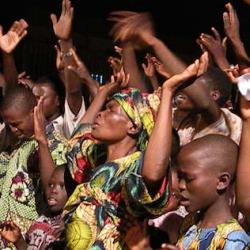At the end of his Word Made Global, Mark Gornik lists a number of the gifts that African churches can offer to the rest of the church. One is “an invitation to name ourselves by Pentecost”: “Through the name of Jesus, African Christians believe that the Spirit brings forth new birth, heals the sick, makes days new, conquers the past, casts out evil spirits, answers prayers, speaks in dreams, and raises to new life” (269).
African Christians also offer “a sacramental imagination”: “From birth to death, African Christians believe that their lives are in the hands of God. In tangible, everyday ways, they believe that in God they ‘live, move, and have their being.’ Life is filled withs sacramental value; the Spirit’s presence is not confined to the Eucharist or the occasional miracle that is a sign of God, but fills all of life and all of creation. . . . I would describe African Christianity as a theology of life, of human flourishing. The world is a place of spiritual conflict, and Christ is powerful over all powers and forces” (270).
African Christians can give us “an enlarged reading of the Bible” by helping “the West recover long-neglected themes of deliverance, healing, release, power, and the Spirit. African Christians can also help the West recover the Gospels and Acts – the stories of the New Testament – and not just privilege Paul. . . . They can help us read the whole canon without a rational filter that limits the ongoing work of God in the world. Overall emphasis is placed on not just reading but living within the narrative that Scripture records” (271).
African Christians offer a fresh vision of mission. The immigrant churches that Gornik studied are “on the cutting edge of urban ministry in the twenty-first century. Models more of being than doing, of witness rather than moral transformation, these churches’ mission practice is holistic – healing, delivering, and praying – because salvation is comprehensive. . . . African churches are both fully present to the local and ever in motion within the global. It is the church that is in mission, not a mission organization” (272-3).










